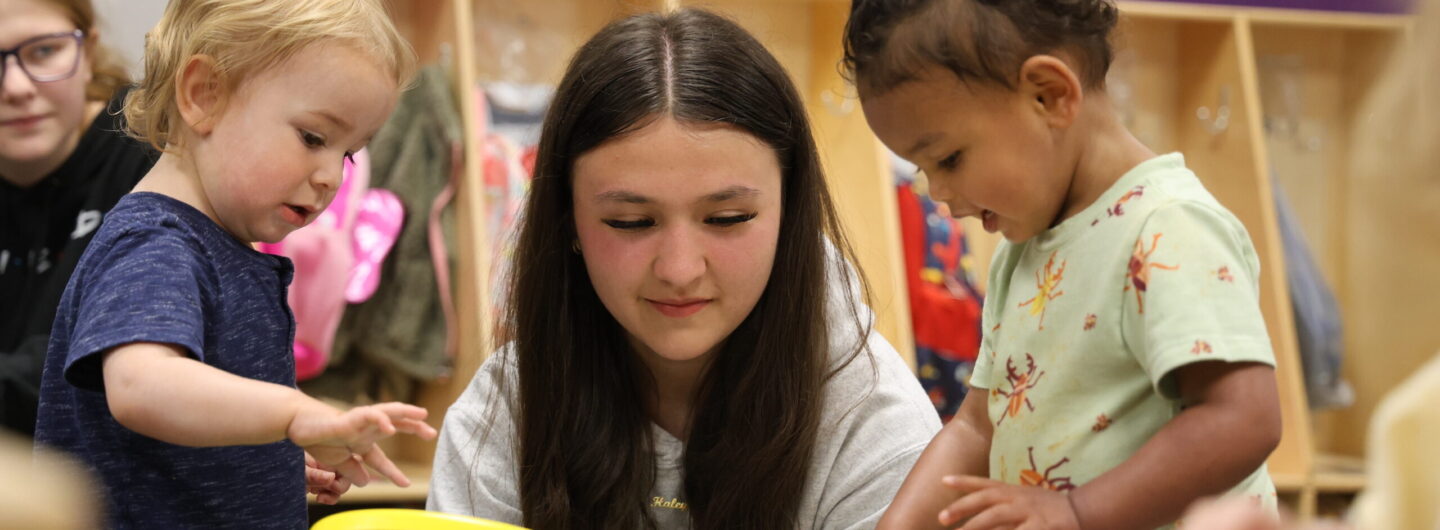This pathway is designed to prepare students for rewarding careers in childcare and education by offering a blend of theoretical knowledge and practical experience, enabling students to develop essential skills for personal development and professional growth.
Whether you’re interested in understanding human relationships, pursuing a career in childcare, or becoming a teacher, our comprehensive curriculum provides the foundation you need to succeed.
Family/Education Pathway at a Glance
Family Courses
Family and Interpersonal Relationships, Independent Living, Human Development, Pregnancy to Infant Development, Child Care Experience
Education and Training Courses
Introduction to Exceptional Students, Exploring the Teaching Profession, Educational Foundations, Field Experience, Intro to Early Childhood Education; Child Health, Safety, and Nutrition
Check out the Program of Studies for a complete list of course offerings and descriptions.
National Workforce Statistics for Preschool Teachers
| 2023 U.S. median pay | $37,130 per year/$17.85 per hour |
| No. of jobs in 2022 | 512,300 |
| Projected no. needed annually | 56,300 |
Southeast Iowa Workforce Statistics
| Preschool teacher wage | $18.56-$22.38 per hour |
| Openings per year | 50 |
Family Courses, Learning Objectives & Areas of Focus
Family and Interpersonal Relationships
This course helps students understand and manage various relationships throughout their lives. Topics include self-examination, family dynamics, peer interactions, dating, long-term relationships, human sexuality, and reproductive health. Students will learn to create and evaluate healthy relationships, choose a marriage partner, adjust to married life, cope with crises, and decide on parenthood.
Independent Living
Students learn essential life skills for managing resources independently. Topics include decision-making processes, financial management, career and housing choices, transportation, clothing care, time management, and personal organization. Nutritional needs and food preparation are also covered, providing a holistic approach to living independently.
Human Development
This course explores the physical, social, emotional, and intellectual growth of children from infancy to adolescence. Students acquire knowledge and skills essential for child care and guidance. Topics include creating nurturing environments, proper nutrition, toy selection, storytelling, and understanding bodily changes that affect child development.
Pregnancy to Infant Development
Focusing on development from conception through infancy, this course is ideal for future parents or those interested in working with children. It covers interpersonal skills, decision-making, family strengths, child development and care, nutrition, dietary practices, budgeting, consumer buying, and managing family housing needs.
Child Care Experience
Students apply knowledge from early childhood development courses by observing and interacting with children of various ages. They develop and teach age-appropriate lessons in different childcare settings, moving through various environments and age groups. Weekly discussions focus on lesson planning and goal setting for each setting.
Education and Training Courses, Learning Objectives and Areas of Focus
Introduction to Exceptional Students
This course introduces students to the responsibilities of teachers, focusing on designing activities for peers and addressing cognitive disabilities, social skill deficits, self-esteem improvement strategies, and mentoring. Students engage in a variety of educational and recreational activities.
Exploring the Teaching Profession
Students learn the principles of teaching and learning, classroom management, student behavior, leadership, human relations skills, assessment of student progress, and teaching strategies. This course provides insights into various career opportunities in education.
Educational Foundations
Students examine the historical, philosophical, sociological, political, economic, and legal foundations of the American public education system. They explore school curriculum design and organization and the characteristics of effective Pk-12 schools. This course includes a co-requisite field experience component.
Field Experience
This co-requisite to Educational Foundations offers students the chance to observe teachers in local classrooms and work directly with students under supervision. This practical experience is invaluable for those considering a teaching career.
Introduction to Early Childhood Education
Students gain an overview of early childhood programs and curricula, both historical and contemporary. This course examines the qualities and skills necessary for working with young children, preparing students for careers in early childhood education.
Child Health, Safety, and Nutrition
Focusing on the development of children from birth to age eight, this course blends theory with practical applications and assessments. Topics include health, safety, and nutrition, providing evidence-based concepts essential for working with young children.


